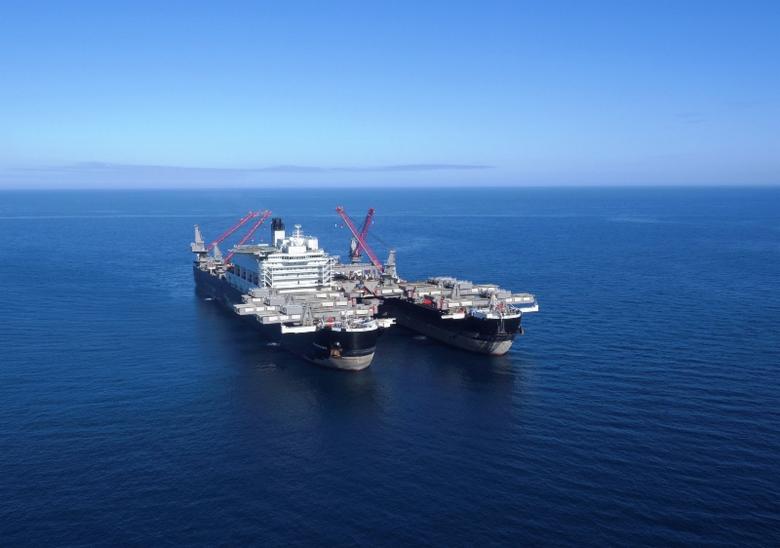
RUSSIA - TURKEY RECONCILIATION

FT - One day last month, the world's largest ship squeezed through the narrow Bosphorus strait dividing the European and Asian sides of Istanbul. The Pioneering Spirit, which is the length of five jumbo jets and wide enough to accommodate three football pitches, passed under the Bosphorus Bridge with just metres to spare.
Its destination was the Black Sea, where it will take part in the construction of the Turkstream gas pipeline between Russia and Turkey. Pipe laying began in May, just seven months after the $12.7bn project was agreed by Russian president Vladimir Putin and his Turkish counterpart Recep Tayyip Erdogan.
It is scheduled to begin operations in 2019, with one pipe serving the Turkish domestic market and another extending into southern Europe.
The speedy development of the project underscores a rapprochement between Turkey and Russia over the past year. The countries had been locked in a period of tension after Turkish forces shot down a Russian fighter jet over the Syrian border in 2015.
Yet even then, the energy relationship between Russia and Turkey did not grind to a halt, according to Gareth Winrow, an independent analyst who specialises in Turkish energy. "Both sides realise they need each other," he says.
Turkstream has been promoted by Mr Putin as a way to deepenaccess to the Turkish market, which was the second biggest for Russian natural gas last year after Germany, and to support his strategic objective to bypass Ukrainian pipelines.
For Mr Erdogan, the prospect of a direct line to Russia's vast energy reserves is a more mixed blessing. With few fossil fuel resources of its own, Turkey needs reliable and affordable supplies to keep its economy humming.
Russian gas has accounted for much of the average 4.4 per cent annual increase in energy consumption by Turkey between 2005 and 2015 — by far the highest growth rate in Europe. Across the continent, demand declined by an average of 0.4 per cent a year over the same period, according to a report by BP.
In the long term, however, Mr Erdogan sees Turkish dependence on Russia for more than half its gas as a strategic risk. The man charged with diversifying Turkey's energy supplies is Berat Albayrak, Turkey's energy minister. The son-in-law of Mr Erdogan, he is becoming one of the country's most powerful politicians.
He and Mr Erdogan have championed the new Trans-Anatolian pipeline, due to open next year, that will link Turkey with Azerbaijan's giant Shah Deniz gasfield, operated by BP. The project is part of a wider EU-backed push to reduce European dependence on Russian gas by developing supply routes from the Caspian basin and beyond through a network known as the Southern Gas Corridor.
Simultaneous support for Turkstream and the Southern Gas Corridor is emblematic of a Turkish foreign policy that is increasingly torn between its Nato ties to the west and regional interests to the south and east.
Ankara hopes that widening its sources of gas will give it more leverage to negotiate lower prices with rival suppliers. It also has long-term ambitions to become an energy trading hub, where gas from Russia, central Asia and the Middle East would be aggregated and sold on to buyers in Europe.
Further pipelines have been mooted from Israel and Kurdish northern Iraq, and the country has laid the groundwork for imports from elsewhere in the world with the opening last year of its first liquefied natural gas terminal in the Aegean port of Aliaga. The facility uses relatively low-cost floating infrastructure and at least two more terminals are planned.
Analysts question whether there is enough domestic demand to justify such a proliferation of supplies. They also doubt that the political will exists to carry out the market reforms that will be necessary to make Turkey a regional hub.
Turkish gas consumption fell 3.7 per cent last year as the economy slowed and long-term growth in the market is set to be curbed by a government push to promote nuclear and renewable power as well as locally-mined lignite coal as alternatives to imported gas.
In Turkstream, some analysts see a Russian attempt to choke off rival supply routes. "One of the aims is to undermine the case for investment in Azerbaijan, so that more share is held by Gazprom [the Russian state gas supplier]," says Matthew Bryza, former US ambassador to Azerbaijan. "Russia is trying to slow or cannibalise the Southern Gas Corridor."
Meanwhile, Russia has hedged against a slowdown in Turkish gas demand by positioning itself to also benefit from the country's investment in nuclear power. Rosatom, the Russian state-owned nuclear company, is leading the development of the $20bn Akkuyu power station in southern Turkey. Construction of what would be the first Turkish nuclear plant is expected to begin next year, with electricity due in 2023.
Emre Erturk, head of Enerji IQ, an energy research organisation, predicts that Russia's knack for energy diplomacy means that Moscow will find ways to preserve its influence however Turkey's energy landscape evolves.
He says: "Whenever you open a new door, you see Russia in different clothes."
-----
Earlier:
RUSSIA:
GAZPROM: RUSSIAN GAS FOR EUROPE
RUSSIAN GAS PRODUCTION: 637 BCM
IMF: EXTERNAL RISKS FOR RUSSIA
TURKEY:




